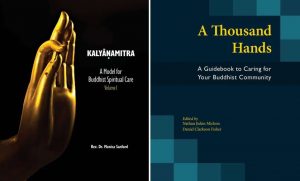
In classical Greek philosophy, the word eudemonia is translated as “flourishing,” a very special state of being that entails finding meaning, purpose, and satisfaction in one’s life and work. “Flourishing” is a more profound translation than other suggested words like “wellbeing” or “happiness” because flourishing entails fulfilment even before one’s work has ended, and this is encapsulated in the expression of “virtue is its own reward.” In trying to refrain from harming others and doing good deeds we might often fail, but it is the endeavour that is crucial. The meaning of life is the meaning that sentient beings give to their karmic circumstances.
There is a classic maxim that asserts, “It is the journey that counts, not the arrival.” This is another face of “virtue as its own reward” and forms an important part of the concept of eudemonia. It means that whenever one is doing something that is conducive to compassion, wisdom and happiness – such as mastering a different language, building a loving relationship with another person, or learning a new discipline, that very practice or act is the meaning of one’s life. Most of us can relate to the joy of reading a particularly well-written book, and poring over it again even after we have already finished it several times. This act of doing, not completing,is the meaning that is found in many kinds of practice, such as moral, philosophical, and religious practice. The point is that if someone is experiencing true eudemonia, she is happy and fulfilled even if her dream or endeavour is not realized. Flourishing is essentially a state of practice.
This idea is consonant with the journey of the bodhisattva. The bodhisattva’s path is detailed in various ways within the sutras and has been aspired to by many modern Buddhists. They have devoted themselves to benefiting other beings and have illuminated the lives of others with virtue and love. Yet the project is never totally complete. The bodhisattva knows that her destination is Buddhahood. She has also vowed to guide all beings to Buddhahood, regardless of how innumerable they are. But by the necessity of her vow, she must dwell in the universe of samsara, in the worlds of forms and attachments. This is the universe of disappointment and dissatisfaction. It is a world where people struggle for many years to attain any sense of eudemonia, and even this is difficult to achieve due to the three poisons that have clouded humanity’s basic Buddha-Nature. Sincere disciples working toward Buddhist wholeness are not exempt from hurt, heartache or disappointment. They need intimacy, healing, and heartfelt sharing with others like every human being. Often, they find that their projects are incomplete and end in failure. But this incompleteness is part and parcel of the very vow that they have taken.
The Bodhisattva Vows are extremely difficult. How is it even possible to consider liberating all beings in time and space? Is it even possible to “flourish” in a world mired in suffering? The Buddhist answer is an emphatic, unapologetic yes. The bodhisattva is not a tragic hero burdened by the sins of the worlds. To assume that the bodhisattva is miserable because her work is not finished is to misunderstand the sutras. A working bodhisattva does not experience the basic existential frustration that confronts ordinary beings. She already knows that the passage of all beings to Buddhahood presupposes an essentially never-ending project. The lotus symbolizes her perseverance and capacity. The lotus grows from muddy, unclear waters, but it still manages to reach higher than other plants in the lake. The Buddhist teachings take this allegory further and assert that human beings can benefit others and help them reach wholeness and maturity as well. This Buddhist flourishing, or religious eudemonia, is encapsulated in practicing the vows one has taken, be they the Five Precepts or Bodhisattva Vows. The point in the vows is to ensure that one flourishes – and helps others to flourish – in a deluded and suffering world.
Eudemonia is, according to humanist philosophy, the objective and outcome of a meaningful human life. The good life is intelligently and altruistically lived, open to beauty and pleasure, and nourished by intimacy and freedom. Meaning is realized when human beings accord a measure of value to the projects they embark on. These projects could consist of starting a family, learning a musical instrument, or donating to charities. Buddhism goes beyond the humanist eudemonia and offers meaning to the beings that wish to lift all sentient beings out of the muddy waters of samsara. By embarking on this mission, disciples of the Buddha should pay foremost attention to healing the anguish of sentient beings by transforming their existential dissatisfaction into non-attached tranquillity and wise compassion.












